

Taking Notes for the Listening Section of the TOEFL® Test
Taking Notes for the TOEFL Listening A Step-by-Step Guide
Let’s start by addressing the big, fat elephant in the room.
Every student’s favorite question…
“Do I have to take notes?”
No, you don’t have to take notes.
Say what?
Seriously. Many students find the TOEFL Listening Note taking process so difficult that they give up and just listen without taking notes.
And, some do well.
However, almost none score above a 25/30 in the TOEFL Listening section.
Most TOEFL Listening passages are at least five minutes long, and they are jam-packed with content.
It’s nearly impossible to remember enough information to answer every question correctly, which is why most who don’t take notes fail to score higher than a 25.
But if you’re anything like us, you want to be at your best. You want to maximize your potential and reach the highest possible score you can in the listening section.
And we want to show you how to do it.
We are going to take you step-by-step through the notetaking process for the TOEFL Listening so you know exactly what you need to do to take more notes in less time.
We will start with the three TOEFL Listening notetaking tips you must master first. And from there, we are going to use those tips to help us write notes for listening to conversations and lectures.
Let’s do it!
Oh snap, before I forget, let me add a link here to our free download of 100 Practice Questions for the TOEFL Listening Section.
We specifically designed these questions for students like you who are looking to build their TOEFL Listening note taking strategies.
Check it out and let us know if you have any questions.
How to take notes in the TOEFL Listening section?
All right, back to the lesson.
Three rules for taking TOEFL notes
- Write down only nouns, verbs, and adjectives (content words)
- Write down consonants (vowels are hardly ever needed)
- Know your core symbols
#1 Write down only nouns, verbs and adjectives
Let’s use some fancy vocabulary here.
You should write down only content words, and leave out function words.
Content words are meaningful words that contain significance, such as people or places, actions, and descriptions.
Function words are things like prepositions, articles, auxiliary verbs (have), and modals (may, could), which provide almost no useful information about the material.
Well, there are SOME cases in which function words come in handy. They may help you in instances where they are essential to understanding the main idea of a given sentence, for example, “He’s in the car”, and “He’s under the car,” carry a significant difference in meaning. Still, for the most part, you should focus only on writing down nouns, verbs, and adjectives.
Let’s practice. Only jot down the content words that will be most helpful in aiding your memory.
Insomnia, a consistent difficulty in falling or staying asleep, is the most common of the sleep disorders.
Insomnia common disorder
It is not uncommon for people suffering from insomnia to experience increased levels of anxiety about their inability to fall asleep.
More anxiety falling asleep
Chronic insomnia is almost always associated with feeling overtired and may be associated with symptoms of depression.
Chronic symptoms overtired depression
Not so bad, right?
Now let’s move on to the next rule.
#2 Write down consonants, not vowels
- sleep → slp
- symptoms → smptms
- depression → dprsn
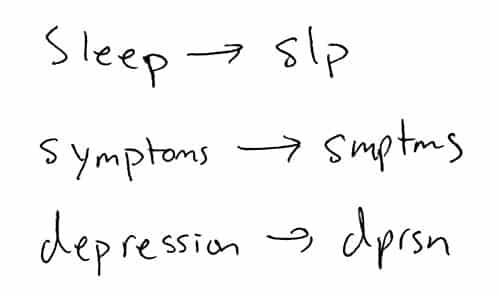
- anxiety → anxty
- create → crete
- treaty → trty
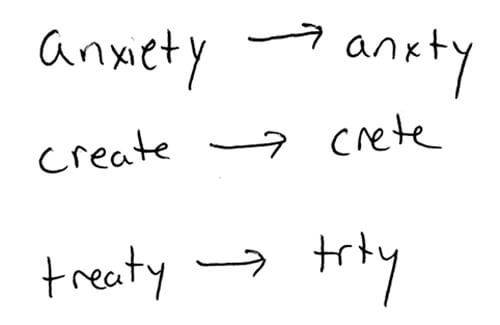
Experiment and find an approach that works best for you.
Let’s try those sentences again, this time incorporating rule #2, only consonants.
Insomnia, a consistent difficulty in falling or staying asleep, is the most common of the sleep disorders.
- Insma cmn dsrdr
Now try the next two on your own…
It is not uncommon for people suffering from insomnia to experience increased levels of anxiety about their inability to fall asleep.
Chronic insomnia is almost always associated with feeling overtired and may be associated with symptoms of depression.
Exciting right?
I know, I know, the TOEFL can be a bit dry sometimes, so, if you are reading this right now I am so proud to be able to share this information with someone as motivated as you are to achieve your TOEFL score.
Let’s get back into it.
There’s one more important rule to consider when taking notes for the TOEFL Listening section.
#3 Know your core symbols
Below is a chart of the nine most important symbols to incorporate in your TOEFL Listening note taking.
Important Symbols |
|
|---|---|
| Symbol | Meaning |
| + | benefit, positive, also, as well, together, combined |
| Ø | not, no, negative, stop |
| ? | I'm not sure, lecturer not sure, question |
| ↑ | rising, increase, improve, positive, beneficial |
| ↓ | going down, decreasing, problematic, hurting |
| → | leads to, results in, follows |
| = | is equal to, the same as, something is like/similar to |
| ≠ | not equal to, not the same as, dissimilar |
| / | and, connected to |
Symbols are important. Not only do they save time, but also increase the amount of information you write down about the listening passages.
But if you are new to using symbols, do NOT try to incorporate all nine of these symbols in your notes at once.
The key is to keep it simple. Start with just two or three. I suggest the arrows since they are the easiest to understand.
As you start to feel more comfortable, incorporate more of these symbols in your note taking listening exercises. Remember, it’s hard to change a habit. You have been taking notes your own way for years. It will take some time to get used to all of this information, so take it slow.
Let’s look at those sentences again. So far we have noted the content words and omitted most of the vowels, now let’s include a few symbols.
Insomnia, a consistent difficulty in falling or staying asleep, is the most common of the sleep disorders.
- Insmna = cmn slp dsrdr
It is not uncommon for people suffering from insomnia to experience increased levels of anxiety about their inability to fall asleep.
- ↑ anxty ⌀ aslp
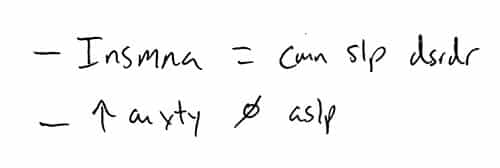
You try the last one…
Chronic insomnia is almost always associated with feeling overtired and may be associated with symptoms of depression.
See. It’s getting easier already!
Right?
Right…
How to take notes for TOEFL Listening Conversations
- Write down content words
- Write down consonants
- Know your core symbols
- The student presents a problem
- The campus worker offers a solution
- They discuss how to solve the problem
- problem
- solution
- steps
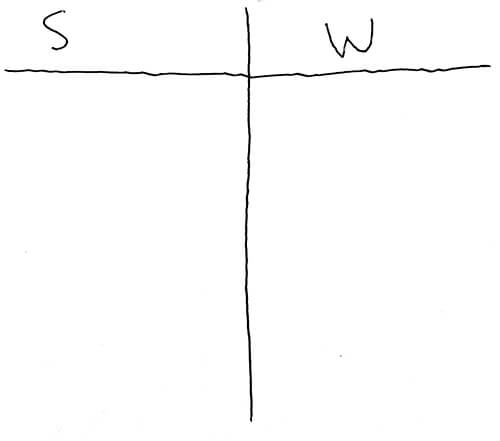
- S = student
- W = campus worker
- Things you could write down – relatively easy to remember, so you probably don’t have to write it down
- Things you should write down – important information that is slightly more difficult to remember
- Things you must write down – information that is definitely important and difficult to remember
Get access to TST Prep’s Complete Test #13 so you can learn exactly what to expect on test day.
Go to the listening section and practice taking down notes for the two conversations. Don’t try to write down everything, but instead focus on the structure of the TOEFL Listening conversation and the most important points.
- could
- should
- must
Your Notes |
|
|---|---|
| could |
|
| should |
|
| must |
|
Stop trying to understand every detail of the listening. Start to focus on points you must write down, like assignment requirements and rules that need to be followed, which are much more likely to help you answer the questions.
How to take notes for TOEFL Listening Lectures
Most TOEFL teachers and books tell you that when you are listening to the lecture, you have to write down the main idea. Well, I have some surprising news…
Despite what you might think, the main idea of the lecture is not the most important thing you want to look for.
That’s right, you do NOT have to write down the main idea in your notes.
- “Why does the professor say this?”
- “What does the professor want the students to know by the end?”
- “Why is this information important?”
- “How does the professor elaborate on, explain, or illustrate the main idea?”
Your job is NOT to understand every word you hear, but instead to identify the main idea and the important points that elaborate on the main idea.
- Things you could write down – relatively easy to remember, so you probably don’t have to write it down
- Things you should write down – important information that is slightly more difficult to remember
- Things you must write down – information that is definitely important and difficult to remember
Your Notes |
|
|---|---|
| could |
|
| should |
|
| must |
|
Practice makes perfect?
I know this TOEFL stuff can get a bit frustrating sometimes. So don’t hesitate to reach out and let us know if you have any questions or concerns: contact@tstprep.com
Did we miss anything? Or do you have a comment?
Please add your ideas in the comments section below.
We promise to respond to every single one!
Also read:
Create a FREE
Practice Account
Join now and start learning with our free materials



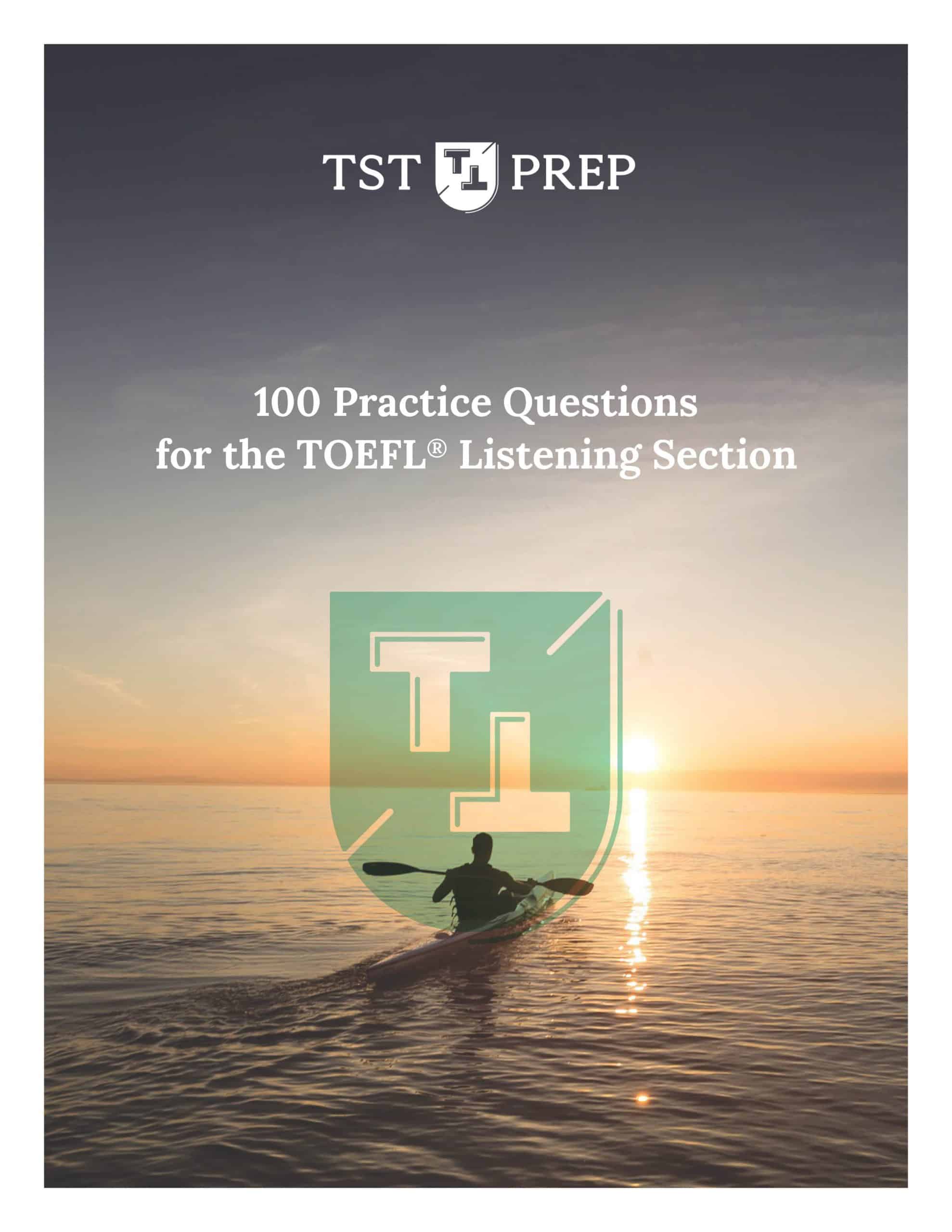
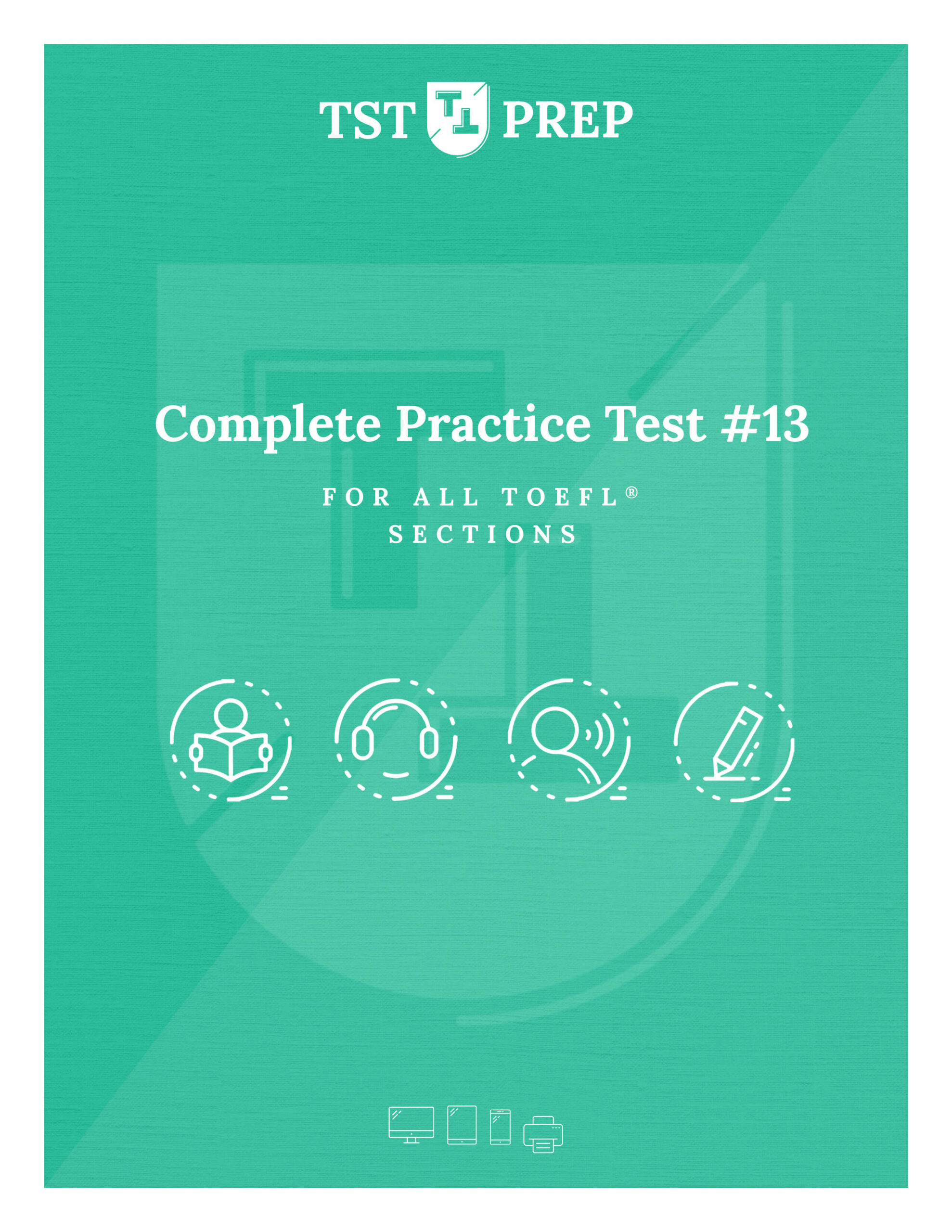




45 Comments
Comments navigation
Omer
That was a great lesson thank you so much! Still I have a big trouble with toefl listening. I can listen and understand many sites such as VOA(Voice Of America) but when it comes to TOEFL, i cannot understand even slow lectures. The problem is I cannot take notes, when I take I miss the following informations. I am a native Turkish speaker by the way and unfortunately almost all my friends do not take notes. And they say we are not skilled enough to take notes and listen at same time.
Josh
Hi Omer and thank you for the comment. I would start by taking a few notes, just a couple of words that you feel are important and then build up your skills.
Also, try some of these short listening passages. Start small, focusing on shorter passages and fewer notes and then have small goals, for example, today I will write five words down and tomorrow six.
https://tstprep.com/courses/toefl-listening-practice-pack-sample/
Setting small, incremental goals will help you build your skills for the TOEFL over time.
You might also want to consider enrolling in classes with a teacher that can help you build these skills over time. https://tstprep.com/toefl-store/toefl-private-lessons/
I hope that helps.
Mohammed Fouzi Saeed Saleh Alsharabi
How can I be familiar with the native speaker accent?
Josh
Good question and we are currently working on a program to address this very issue. For now, I will recommend Rachel’s English, a website devoted to American accent training. https://rachelsenglish.com/
Check back around November and the course/materials on accent should be available then.
Aderonke Olajide
It was a clear and straight forward write up, thank you so much. Though opening the sample exercise is difficult, but sure to use other device when I get home after work today. Ho many months do you suggest for practice if I practice an hour or more daily before the exams. thank you.
Josh
Hi there and good question. A lot depends on your strengths and weaknesses and how you study exactly. Also, I do not know your current level or what score you need, so a lot depends on various factors and it is impossible for me to tell each individual student what they need without meeting him or her. Sorry I can’t give you a more specific response. If you are really curious, you might want to consider a trial lesson at this link – https://tstprep.com/toefl-store/toefl-private-lessons/ – the teacher will give you an idea of your current level and what you need to do to get to your desired score.
Amruta
Great content.. very informative.. will definitely apply these tips and tricks.. 🙂 🙂
Josh
That’s great Amruta! Let me know if there is any other way I can help.
Elhadi
Wow! I can’t explain you that how you are made me feeling. I’m really sure everyone who hsa read it would mede a huge difference. It’s more than tips. I really appreciate into my deep heart Josh .
Josh
Wow! What a sweet compliment Elhadi, thank you. Glad to hear you found it helpful!
Comments navigation